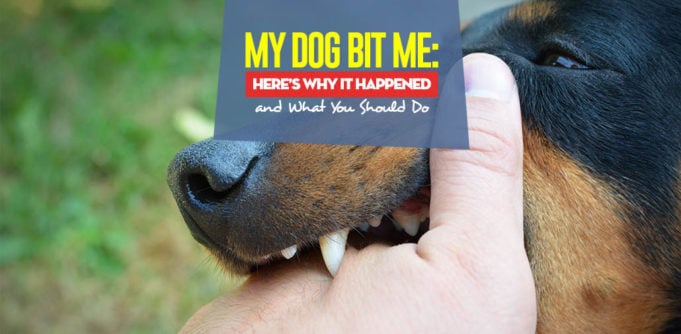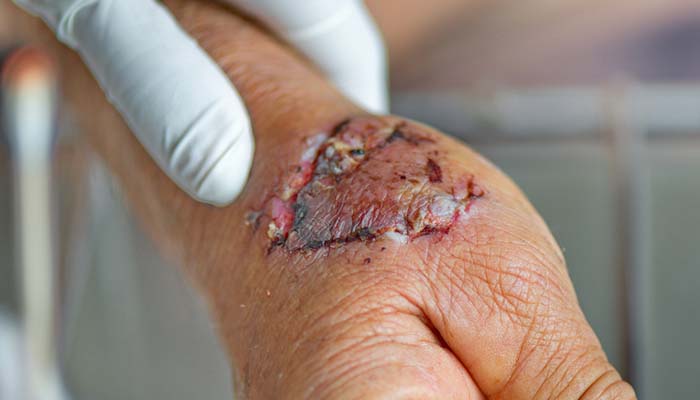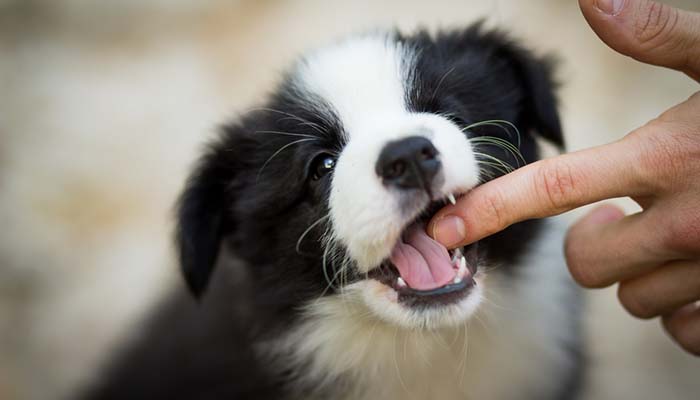More than 4.5 million people suffer from dog bites in the US each year, and more than 800,000 receive medical attention for it, according to the American Veterinary Medical Association. If you look online, you'll see that “my dog bit me” is a common search query and many pet owners have to deal with this.
An incident of this kind can be particularly upsetting if it's your own dog and especially so when you have small children. Recent studies have shown that kids are more likely to be victims of dog bites and suffer severe injuries from it, marking dogs as the 2nd most dangerous animal in the USA.
In some cases, an act of dog biting the owner can present a clear sign of a deeper psychological problem, which might force you to give up your dog. However, this is not always the case and before you do anything rash, thoroughly assess the circumstances that led to the incident. So, if my dog bit me, is there anything I can and should do?
ALSO READ: 20 Dog Breeds With the Strongest Bite Force
My Dog Bit Me – What to Do Next?
Stay Calm
You need to keep your composure and stay calm right after the incident. Any kind of overreaction on your part can endanger you and make the situation worse. If you scream or move a lot you can make your dog more aroused, according to Dr. Sophia Yin.
Quarantine your dog and give him time to calm down but do not physically punish the dog. If you are not able to put him in another area, then you should leave the area yourself and make sure that you are physically safe from another attack.
Determine how serious your injury is and call your doctor or veterinarian, tell them my dog bit me and ask for advice to see whether you should go to the emergency room. Get in touch with your vet to make sure that your dog is up to date on his rabies vaccination.
Assess the Severity of Incident and Reasons That Led to It
After the incident, you should determine how serious the bite was. There are several levels to severity of dog bites, and you can use this illustrated table (PDF). The severity of your dog's bite can help you decide on the actions you need to take, along with the reasons for the bite.
When my dog bit me for no apparent reason, it's usually an accident; however, it's might also be a signal of a mental problem. Dogs often bite for a very specific reason, and there are several of them. Let's take a look at some possible reasons your dog bit you.
My Dog Bit Me, But Why?
6 possible reasons why your dog bit you
1. Puppy Mouthing
If your dog is still a puppy and bites you without breaking your skin, this is called mouthing. Puppy mouthing is very common and it is not serious when your puppy is young, but if you don’t work on his behavior, it can become problematic in the future when your dog becomes bigger and stronger, according to the ASPCA.
What to do:
Using this video and guide to teach your dog to inhibit his bite. When my dog bit me and it was still I puppy, I would normally let the hand go limp and yelp. That will make your pooch release you. Ignore him for 20-30 seconds to teach him to be careful.
Use redirection. When your puppy tries to bite you, pull your hand away and offer him a treat or a chew toy until he bites that.
Use deterrence. There are numerous dog deterrent sprays you can buy that act as a bite repellent that will put an unpleasant taste in your puppy’s mouth and force him to stop mouthing, like the Bitter Apple Dog Chew Deterrent or Yuck! No Chew Spray.
2. Maternal Instinct
If your dog recently became a mother and you tried to approach her puppies, the bite is probably the result of her maternal instinct and desire to protect her puppies.
What to do:
Give her time and space until she becomes comfortable with you being near her litter. And even then, you should approach carefully and without any sudden movements.
3. Prey Drive
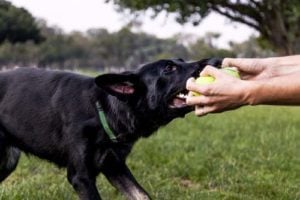 If you were playing with your dog before he bit you, then it was probably his prey drive at fault. My dog bit me several times during playtime, and it's considered an accident. This happens a lot and it usually not a reason to worry because it was caused by your dog getting overexcited.
If you were playing with your dog before he bit you, then it was probably his prey drive at fault. My dog bit me several times during playtime, and it's considered an accident. This happens a lot and it usually not a reason to worry because it was caused by your dog getting overexcited.
What to do:
Adjust the game or avoid it in the future. Don’t play tug-of-war, stick to fetch instead.
4. Pain
You might not notice that your pooch is in pain, but if you touch a spot that hurts he might react instinctively and bite. Watch for signs like constant localized grooming, whimpering, whining or growling, altered breathing, changes in sleeping, eating and drinking and aggressive behavior.
What to do:
Take your dog to the vet to determine if your dog is in pain. The most common medical reasons for aggressive behavior include infections, arthritis, hypothyroidism and various neurological conditions.
5. Fear
The fear aggression is usually directed toward strangers, but your dog can be afraid of you as well. Work on your relationship to avoid being bitten by your dog in the future.
What to do:
Build trust. Walking together with your dog while you act calmly and assertively is a good exercise for building trust with dogs. Spending more time with your dog playing games or exercising can help. Be fair and consistent when you train your dog. Let your dog know that you are there to protect him by not placing him in stressful or uncomfortable situations.
Respect your dog’s space. When appropriate, approach your pooch from the side and crouching, not from the front or let them come to you. Be patient and calm.
6. Possessiveness
 If your dog was playing with a toy before the incident or chewing on something, his attack is due to possessive aggression. This usually happens when your dog thinks that you are trying to take something that is his and this type of dog bite is the most dangerous one. It is not accidental and it requires a lot of training to get it under control. If you do nothing, it can become a very serious, dangerous problem and happen more often.
If your dog was playing with a toy before the incident or chewing on something, his attack is due to possessive aggression. This usually happens when your dog thinks that you are trying to take something that is his and this type of dog bite is the most dangerous one. It is not accidental and it requires a lot of training to get it under control. If you do nothing, it can become a very serious, dangerous problem and happen more often.
What to do:
Establish rules. Your dog must be aware of boundaries and limitations. According to dog trainers, your dog must understand that you provide everything for him and that you are the true owner of his things. A good tactic to assert ownership is to make your dog wait for your permission before accessing his food, water or toys.
Teach “leave it” command. Work on teaching him to put down things and offer a treat when he listens to your command. Work on other essential dog commands as well.
Prevent or treat resource guarding. Many dogs become aggressive if they feel like they have to protect their food or any other resource. Make your dog understand that it is a good thing when you approach his food by using classical conditioning, as explained here by professional dog trainer Grisha Stewart.
Hire a canine behaviorist. Some dogs are harder to train than others, so consider hiring a professional behaviorist if you feel you can't train your dog yourself.
The Bottom Line
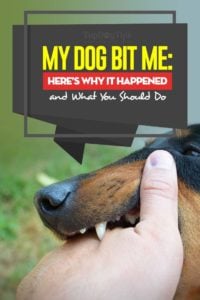 Dog bites are common; some might be a serious problem while others are simply an accident. When your dog bites you, determine what to do based on the severity of the bite and reasons behind it. Some of the most common reasons include puppy mouthing, prey drive, maternal instincts, fear, pain and possessiveness.
Dog bites are common; some might be a serious problem while others are simply an accident. When your dog bites you, determine what to do based on the severity of the bite and reasons behind it. Some of the most common reasons include puppy mouthing, prey drive, maternal instincts, fear, pain and possessiveness.
Work on your relationship and learn how to read your dog’s body language to prevent bites in the future. Teach your dog to listen to your commands and avoid doing things that triggered his aggressive reaction. If your dog is often aggressive, talk to your vet about it or hire a dog behaviorist or a professional dog trainer to fix any problems.
READ NEXT: Dog Facial Expressions and Body Language Explained by Science


